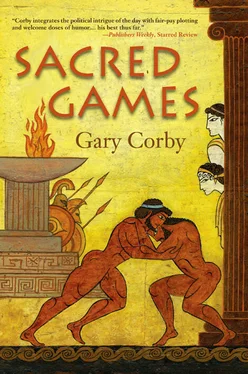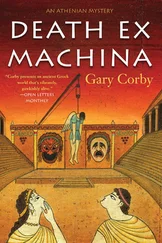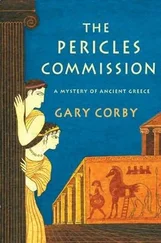Gary Corby - Sacred Games
Здесь есть возможность читать онлайн «Gary Corby - Sacred Games» весь текст электронной книги совершенно бесплатно (целиком полную версию без сокращений). В некоторых случаях можно слушать аудио, скачать через торрент в формате fb2 и присутствует краткое содержание. Год выпуска: 2013, ISBN: 2013, Издательство: Soho Press, Жанр: Исторический детектив, на английском языке. Описание произведения, (предисловие) а так же отзывы посетителей доступны на портале библиотеки ЛибКат.
- Название:Sacred Games
- Автор:
- Издательство:Soho Press
- Жанр:
- Год:2013
- ISBN:978-1-61695-228-0
- Рейтинг книги:3 / 5. Голосов: 1
-
Избранное:Добавить в избранное
- Отзывы:
-
Ваша оценка:
- 60
- 1
- 2
- 3
- 4
- 5
Sacred Games: краткое содержание, описание и аннотация
Предлагаем к чтению аннотацию, описание, краткое содержание или предисловие (зависит от того, что написал сам автор книги «Sacred Games»). Если вы не нашли необходимую информацию о книге — напишите в комментариях, мы постараемся отыскать её.
Sacred Games — читать онлайн бесплатно полную книгу (весь текст) целиком
Ниже представлен текст книги, разбитый по страницам. Система сохранения места последней прочитанной страницы, позволяет с удобством читать онлайн бесплатно книгу «Sacred Games», без необходимости каждый раз заново искать на чём Вы остановились. Поставьте закладку, и сможете в любой момент перейти на страницу, на которой закончили чтение.
Интервал:
Закладка:
Women were forbidden to watch the Games. We know this for sure because the ancient travel writer Pausanias tells us so. He also tells us what the penalty was. I copied it for the sentence passed on Timodemus. Pausanias said:
As you go from Scillus along the road to Olympia, before you cross the Alpheius, there is a mountain with high, precipitous cliffs. It is called Mount Typaeum. It is a law of Elis to cast down it any women who are caught present at the Olympic Games, or even on the other side of the Alpheius, on the days prohibited to women .
It must be added that, to the best of my knowledge, not once did the Greeks ever enact this terrible penalty, not even in the one famous case in which a woman was caught red-handed. This woman was discovered not only inside the stadion, but inside the box from which the coaches of the athletes watched.
The story goes that a lady by the name of Callipateira was the widow of a strong athlete, and that her son also was a fine runner. When her husband died, Callipateira took over the job coaching their son, to the point at which he qualified for the Olympics. Determined to see him compete, Callipateira disguised herself as a man and joined the other coaches in their box. Her son won! Callipateira was the first woman in history to train an Olympic victor. She was so excited that she gave herself away. The judges were entirely unwilling to punish such a remarkable lady, so they told her not to do it again, and then they changed the rules so that no other woman could ever pull the same trick. That is why from that day on, the coaches at the Olympics were required to watch the Games stark naked.
Oddly, the law forbidding women uses the ancient Greek word for married women. As a result it’s become a standard meme on the Internet that unmarried virgins were permitted to watch the Olympics. This is helped by Pausanias making a vague statement about seeing virgin girls at the Games.
Let’s think about that. We have a stadion filled with thousands of drunken, sports-crazed men, and in among them are a bunch of teenage virgins.
I don’t think so.
What is very likely is that fathers brought along unmarried daughters to matchmake them with eligible bachelors from other cities. In fact, I consider it certain that the Olympics was a major matchmaking event. But there’s no way teenage girls were in the stadion when the contests were held. It’s just a recipe for disaster.
There must have been a women’s camp, and it must have been on the other side of the river, given the rule as stated by Pausanias. The placement and the layout is the work of my imagination.
Though women couldn’t compete at the Olympics, they did have their own Games. The Heraea Games were held in honor of Hera, queen of the Gods, just as the Olympic Games were in honor of her husband, Zeus. The women’s Games were severely underreported, in much the same fashion that women’s sport doesn’t get the same attention these days.
When Timodemus says that he’ll wait until he’s thirty, and then ask his father to find him a fourteen-year-old virgin, he’s following the standard system of the times. It was practically illegal for a man to remain unmarried after thirty, but most men waited until the last moment before getting hitched. The men of ancient Greece were notorious commitment-phobes. Probably some modern women are reading this and thinking not much has changed.
Marriage between citizens was always negotiated by the fathers. That’s the source of the problem that Nico and Diotima experience. Given human nature, they can’t have been the first young couple to arrange matters for themselves and then expect their fathers to make it official. This is why Nico is confused about whether Diotima is his wife or his fiancée. The circumstances that led to their predicament are related in The Ionia Sanction .
The words of the ancient Olympic Oath have been lost. The modern oath, with its high ideals and fine values, is unlikely to bear much resemblance to the original. The ancient Olympic Oath appears to have been an anti-cheating device, to which extent it had more in common with the modern oath one takes when giving evidence in court.
To a people who truly believed in the power of the Gods, it was more than lip service to swear by Zeus. The Greeks believed very much in the concept of luck. Except to them, luck was supplied by the Gods. A man who forswore an oath to Zeus could expect very bad luck indeed. The statue of Zeus before which the oath was taken really did show a wrathful god holding a lightning bolt in each hand; I’m not making that up at all.
Despite the oath, cheating certainly did occur. There are known, documented cases, and nearly all of them involve bribery. This is why an athlete’s relatives also had to swear not to cheat.
Anyone who was caught was fined a huge sum, which was used to install a zane-a statue of Zeus-in a public place at Olympia, with the name of the cheater prominently displayed for everyone to see for generations to come. It was a name-and-shame strategy.
Witchcraft was the elephant in the room when it came to cheating in the ancient Olympics, just as drugs are a major problem in the modern Games. We know that witchcraft doesn’t work, but they didn’t.
The Greeks believed in witchcraft-a very different witchcraft to the modern version, but witchcraft all the same. The Greeks wrote curse tablets by inscribing their curse into a thin sheet of lead and then tossing it down a well. Hundreds of these curse tablets have been recovered, some are on display in museums, and they’re all very malicious.
There’s no record of anyone using hemlock to cheat. That part of the story is the product of my own demented imagination. Yet the ancient Greeks certainly knew enough to try it. Hemlock had been the poison of choice for a gentle self-exit for centuries. Indeed on some islands, notably Keos, it was the custom for men when they reached sixty years to take hemlock to make room for the next generation.
Hemlock was prescribed as a folk medicine to treat arthritis and tremors right up until relatively recently. Don’t try this at home. Hemlock is unbelievably deadly, and as Heraclides points out in the book, the line between a medicinal and a fatal dose is very slim.
Heraclides displays an unusual degree of skill for the primitive state of ancient Greek medicine, but I think we may reasonably expect high ability from the father of Hippocrates. After all, Heraclides taught his son.
Hippocrates is the most famous doctor in all of history. To this day the word “Hippocratic” is synonymous with the very best in medical practice. Doctors still swear the Hippocratic Oath. Hippocrates wasn’t the world’s first doctor, but he was the first to record the effects of his treatments, and to apply the principle of doing what he saw worked, and refrain from repeating what didn’t. Today we’d call it evidence-based medicine. Hippocrates invented it.
At the time of this story, the man destined to become the world’s greatest doctor is one year old. The name of his father really was Heraclides. In those days, doctors learned their trade by apprenticeship to their fathers.
Such was Hippocrates’s skill that the Greeks in his own lifetime called him Hippocrates the Great. Despite which, there is only one contemporary mention of him in surviving books. I know this seems almost too good to be true, but the only contemporary reference to Hippocrates comes from none other than Socrates!
It happens in a book called Protagoras , written by Plato, in which Socrates refers to Hippocrates of Kos in a familiar way that makes it clear the two men were acquainted: yet another amazing proof that the men and women who founded our civilization all knew one another.
Читать дальшеИнтервал:
Закладка:
Похожие книги на «Sacred Games»
Представляем Вашему вниманию похожие книги на «Sacred Games» списком для выбора. Мы отобрали схожую по названию и смыслу литературу в надежде предоставить читателям больше вариантов отыскать новые, интересные, ещё непрочитанные произведения.
Обсуждение, отзывы о книге «Sacred Games» и просто собственные мнения читателей. Оставьте ваши комментарии, напишите, что Вы думаете о произведении, его смысле или главных героях. Укажите что конкретно понравилось, а что нет, и почему Вы так считаете.












